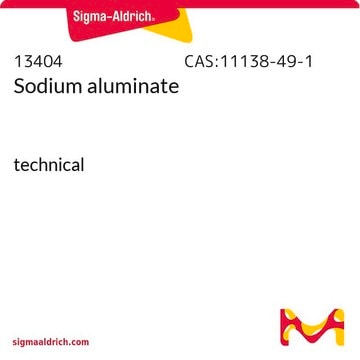96096
Zeolite
Sinónimos:
Aluminosilicate
Iniciar sesiónpara Ver la Fijación de precios por contrato y de la organización
About This Item
Productos recomendados
formulario
powder
tamaño de partícula
<20 μm
¿Está buscando productos similares? Visita Guía de comparación de productos
Descripción general
Choosing a Molecular Sieve:
1. The preferential adsorption of one molecule over another depends upon pore diameter and mesh size.
2. The dynamic capacity of the silica gel for adsorbing a particular compound is governed by the internal surface area; the greater the surface area, the greater the dynamic capacity.
3. Rate of adsorption and sharpness of resolution are dependent chiefly on particle size and column packing; a fine particle size gives optimum sharpness of resolution.
4. Liquids are most readily adsorbed from solvents in which they are least soluble; a good solvent makes a good desorbing agent.
5. Highly polar liquids are readily adsorbed. Compounds having hydroxyl groups, or containing oxygen are strongly adsorbed.
6. For similar compounds, the higher the molecular weight the higher the selectivity.
7. For hydrocarbons of similar molecular weight, adsorptivity increases with the number of double bonds.
1. The preferential adsorption of one molecule over another depends upon pore diameter and mesh size.
2. The dynamic capacity of the silica gel for adsorbing a particular compound is governed by the internal surface area; the greater the surface area, the greater the dynamic capacity.
3. Rate of adsorption and sharpness of resolution are dependent chiefly on particle size and column packing; a fine particle size gives optimum sharpness of resolution.
4. Liquids are most readily adsorbed from solvents in which they are least soluble; a good solvent makes a good desorbing agent.
5. Highly polar liquids are readily adsorbed. Compounds having hydroxyl groups, or containing oxygen are strongly adsorbed.
6. For similar compounds, the higher the molecular weight the higher the selectivity.
7. For hydrocarbons of similar molecular weight, adsorptivity increases with the number of double bonds.
Regeneration or Activation:
A saturated molecular sieve can be restored to its original capacity by regeneration, the principle of which involves changing the conditions surrounding the adsorbent to correspond to a very low equilibrium capacity. In general, the greater the difference between the equilibrium capacities of adsorption and regeneration, the more rapid and complete the regeneration.
The sieve may be regenerated in one of four ways:
1. Thermal reactivation –The maximum regeneration temperature for Silica is 300°C.
2. Pressure reactivation
3. Passing an appropriate fluid through the gel bed at normal temperature and pressure.
4. Displacement of adsorbates by passing a high concentration of molecules in a fluid through the bed.
A saturated molecular sieve can be restored to its original capacity by regeneration, the principle of which involves changing the conditions surrounding the adsorbent to correspond to a very low equilibrium capacity. In general, the greater the difference between the equilibrium capacities of adsorption and regeneration, the more rapid and complete the regeneration.
The sieve may be regenerated in one of four ways:
1. Thermal reactivation –The maximum regeneration temperature for Silica is 300°C.
2. Pressure reactivation
3. Passing an appropriate fluid through the gel bed at normal temperature and pressure.
4. Displacement of adsorbates by passing a high concentration of molecules in a fluid through the bed.
Aplicación
Zeolite, a microporous, aluminosilicate mineral, is used as a molecular sieve and as an adsorbent of a wide variety of cations, such as Na+, K+, Ca2+, Mg2+ and others. Zeolite is used in the development of a variety of bioreactor devices.
Otras notas
In the determination of serum triglycerides
Código de clase de almacenamiento
11 - Combustible Solids
Clase de riesgo para el agua (WGK)
nwg
Punto de inflamabilidad (°F)
Not applicable
Punto de inflamabilidad (°C)
Not applicable
Equipo de protección personal
Eyeshields, Gloves, type N95 (US)
Certificados de análisis (COA)
Busque Certificados de análisis (COA) introduciendo el número de lote del producto. Los números de lote se encuentran en la etiqueta del producto después de las palabras «Lot» o «Batch»
¿Ya tiene este producto?
Encuentre la documentación para los productos que ha comprado recientemente en la Biblioteca de documentos.
Lactic acid production on liquid distillery stillage by Lactobacillus rhamnosus immobilized onto zeolite.
Djukic-Vukovic AP, Mojovic LV, Jokic BM, et al.
Bioresource Technology (2012)
Hossein Jahangirian et al.
International journal of nanomedicine, 15, 1005-1020 (2020-02-28)
The aim of this study was to prepare zeolite/iron (III) oxide nanocomposites (zeolite/Fe2O3-NCs) as a smart fertilizer to improve crop yield and soil productivity. Zeolite/Fe2O3-NCs were successfully produced by loading of Fe2O3-NPs onto the zeolite surface using a quick green
C Mery et al.
Journal of environmental science and health. Part A, Toxic/hazardous substances & environmental engineering, 47(3), 420-427 (2012-02-11)
An evaluation of natural zeolite as a microorganism carrier in nitrifying reactors operated in batch mode was carried out. Specifically, the influence of zeolite particle sizes of 0.5, 1.0 and 2.0 mm in diameter on microorganism adherence to zeolite, ammonium
Mehran Andalib et al.
Bioresource technology, 121, 411-418 (2012-08-07)
The primary objective of this work was to investigate the treatability of thin stillage as a by-product of bioethanol production plants using an anaerobic fluidized bed bioreactor (AFBR) employing zeolite with average diameter of (d(m)) of 425-610 μm and specific
Thomas Simons et al.
Beilstein journal of nanotechnology, 3, 667-673 (2012-12-06)
In a proof-of-concept study we demonstrate in situ reaction monitoring of DeNO(x)-SCR on proton-conducting zeolites serving as catalyst and gas sensor at the same time. By means of temperature-dependent impedance spectroscopy we found that the thermally induced NH(3) desorption in
Nuestro equipo de científicos tiene experiencia en todas las áreas de investigación: Ciencias de la vida, Ciencia de los materiales, Síntesis química, Cromatografía, Analítica y muchas otras.
Póngase en contacto con el Servicio técnico





